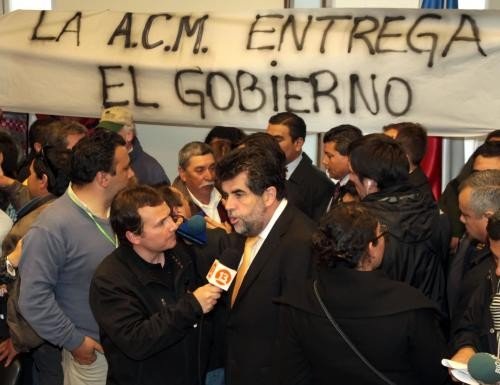Protesters demonstrate at a meeting between the Citizen's Assembly and the Chilean government to discuss the price of natural gas on January 18, 2011 in Punta Arenas. (Jose Villarroel/UPI)
SANTIAGO, Chile, March 9 (UPI) -- A simmering row over natural gas prices for domestic consumers in the Magallanes region of southern Chile showed no sign of a lasting resolution as talks between government officials and community leaders resumed amid continuing bickering.
Community representatives want the government to make permanent a January compromise on gas prices and agree to other concessions before they can pledge not to resume street protests that led to two deaths.
A 10-month moratorium on public protests that began in January gives the government time to negotiate a compromise between the original price hike of 16.5 percent after the withdrawal of state subsidies and a 3 percent price increase that defused the crisis.
Residents in the Magallanes region face cold weather conditions throughout the year.
Community representatives gathered in the Citizens Assembly of the Magallanes region have warned they will resume strikes and other civil action if no satisfactory compromise is reached over what they consider a fair gas price.
The trouble began after the government withdrew state subsidies on gas prices in the region, causing the prices to soar in the midst of winter. Residents protested the government decision and street protests brought the Magallanes economy close to a halt.
Discontent over the temporary price deal lingers, because of uncertainty over the eventual deal that will give residents what they see as a fairer deal on fuel consumption.
The region's main city, Punta Arenas, was paralyzed by the community strike, which also affected tourism to the area and Antarctic attractions further south.
Community leaders have won the support of the mayor of Punta Arenas, Vladimiro Miminca, for a deal that will give residents a fair price. Miminca was in the forefront of the January protests and has urged the government to find a workable solution.
A draft bill likely to go before the Chilean Congress is part of a plan to reach a compromise that will avoid a repeat of crippling strikes that disrupted Magallanes economy.
The public demonstrations took a tragic turn when a truck drove past three street barricades before running over a group of protesters, killing two young women. More than 30 people were arrested in the incidents, and several of them face criminal charges.
The protests brought unprecedented chaos, including street violence and looting, to Punta Arenas.
"It was never the spirit of the people of the region to have violent demonstrations," Miminca said.
Government officials are still said to be hoping to push for a gradual price increase but community leaders have warned the region may erupt in violent protests again before the end of the 10-month deadline.















